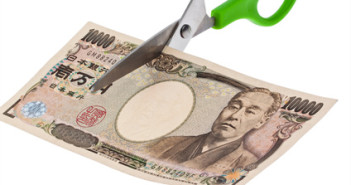The USD/JPY moved to a seven month high overnight as the Bank of Japan began their two day meeting.  Most analysts expect the BOJ to take no action at this meeting, but move ahead with further easing after the December election.  The leader of the Liberal Democratic Party (LDP), Shinzo Abe has stated he will choose someone that is more in favor on inflation targets as the next Bank of Japan Governor if he is elected in December.  Last week, Prime Minister Noda dissolved the lower house of the Japanese parliament and set elections for December. The lastest pols show that Noda’s party will be defeated in the election.
USD/JPY reached a high of 81.58, but technical indicators show the RSI in JPY to be near the 70 level, which is considered an overbought situation, suggesting a reversal is in store for the currency pair. Â At the present time the USD/JPY is trading in the 81.25 area. Â According to the Commodity Futures Trading Commission reports, traders have decreased their short JPY positions in the week ended November 13. Â The number of contracts was 30,447 as compared with 40,104 for the week before. Â The contracts report happened before Prime Minister Noda dissolved the lower house. Â I would expect to see this number increase this week.
The EURO is trading in the middle of its overnight range as finance ministers and the head of the IMF try to resolve the differences that were made public last week regarding how the next bailout to Greece should be handled. Â EU finance ministers will meet tomorrow in Brussels to continue talks about Greece. Â Financing for 2013 and 2014 are expected to be concluded at this meeting. Â IMF President Lagarde is expected to attend the meeting. Â Traders do not expect this to go well as EUR short positions moved to 83,646 contracts according to the CFTC, from 67,141 a week ago. Traders seem to be focusing more on the release of news last week that the Euro-zone economy was headed towards recession. Â The number of short EUR contracts is the largest since September.
In other currencies, the USD/CAD has fallen back below the parity level, while trading in a narrow range overnight. Â With the Israeli-Hamas confrontation in the Middle East escalating, the price of crude oil is rising and this is benefiting the Canadian Dollar. Â Resistance for the USD/CAD appears at 1.0025 and 1.0040. Â Support at .9988 is followed by .9965.
After last week’s talks, there is optimism that President Obama and US Congressional leaders will be able to overcome differences and come to a solution on a deal to avoid fiscal cliff at the end of the year.  FED Chairman Bernanke speaks tomorrow and traders will be listening for any clues to further FED moves.  There is concern that if the US falls over the fiscal cliff, Chairman Bernanke will increase the liquidity that is being added to the domestic economy to prevent a recession.  Observers remark that “Operation Twist†ends in December.  This could be continued simply by adding the amount purchased ($45 billion) to the MBS program.
Overnight, equity markets were higher in Asia and in Europe the markets are higher. Â DOW Futures are slightly positive at 5 am, indicating a good start to the US equity market.
This is a short week for US traders and historically a rather quiet one.  I wouldn’t expect too much movement in EUR.  Look for the currency to hold the 1.27 handle.  We will continue to keep an eye on the middle east, with hopes of a peaceful settlement, sooner rather than later.



